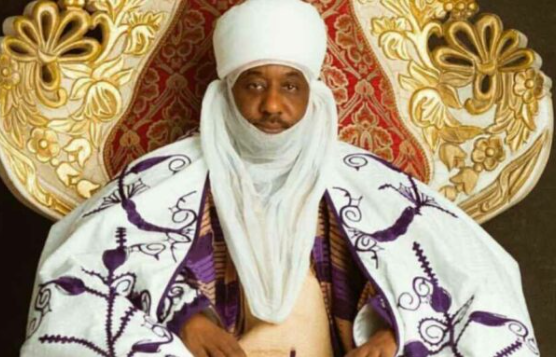
“Nigeria Is Collapsing Before Our Eyes” — Emir Sanusi Raises Alarm Over Nation’s Total Decline

In a fiery and heartfelt statement that reverberated across the nation, the Emir of Kano, His Royal Highness Muhammadu Sanusi II, has sounded the alarm on what he describes as the total collapse of every vital sector in Nigeria. His words came not as the musings of a passive monarch but as a thunderous outcry from a former Central Bank Governor and vocal public intellectual known for never mincing words when speaking truth to power. Represented by Dr. Comrade Auwalu Mudi Yakasai at the 51st National Executive Council (NEC) meeting and training workshop of the Senior Staff Association of Nigerian Universities (SSANU), held at the Aliko Dangote University of Science and Technology, Wudil, Kano, Sanusi’s comments painted a bleak but brutally honest portrait of a country unraveling at every seam.
“Nothing is working in Nigeria anymore, every sector is battered,” he lamented, capturing in one sentence the feelings of millions of Nigerians who have watched, helplessly, as their nation stumbles from one crisis to another. From the hyperinflated cost of living to decaying healthcare, crumbling education, and social services now gasping for air, the Emir made it clear that the Nigerian state is now in the throes of what he described as “unprecedented economic hardship.” His words echoed through the hall like the sound of distant sirens warning of an approaching storm — except this storm is already here, and it’s consuming everything in its path.
Sanusi’s remarks were not merely general commentary. They came with piercing specificity. He pointed to the rise in fuel prices as an example of the unbearable weight being forced upon everyday Nigerians. With the removal of subsidies and the free fall of the naira, the cost of essential goods and transportation has skyrocketed. People are not just struggling — they are being broken by the burden of survival. He criticized what he sees as a disturbing silence among the once-powerful institutions that previously stood up for the people — notably the labour unions.
“In those days, the labour movement was the vanguard of the struggle,” the Emir noted with both nostalgia and disappointment. “They worked hand in hand with student unions, market women, religious leaders. But today, it seems labour has lost its voice.” It was a chilling critique of a movement that, once roaring with revolutionary fire, now seems to have been tamed by political compromises and systemic decay.
He did not merely criticize — he challenged. Addressing the leaders of SSANU, the Emir issued a call to arms: a return to the fundamental principles of trade unionism — cooperation, contestation, and confrontation. He was not just suggesting strategy; he was advocating for survival. “You start with cooperation. If that fails, you move to contestation. And if that doesn’t work, then you confront. Confrontation takes many forms — strike action is just one of them,” he emphasized.
This was not empty rhetoric but a historical reminder of the power unions once held — and must reclaim — to stand as a moral and economic compass in a nation that seems to have lost its direction. His challenge to the union leaders was not just about protest; it was about awakening their conscience and rededicating themselves to the fight for justice, equity, and improved living conditions for Nigerian workers.
In what seemed like a sharp contrast to his somber assessment of the nation, the Emir found a moment to commend the current leadership of SSANU. He praised Mohammed Haruna Ibrahim, the union's president, for promoting transparency and inclusive leadership — traits that are often missing in Nigerian institutions. But even in his praise, there was a reminder: leadership must translate into tangible improvements for the rank-and-file members.
He reflected on how far labour unions had come — from underfunded, grassroots movements to sophisticated organizations with leaders who now travel by air and sit in air-conditioned offices. But with that evolution, he warned, comes responsibility. “Such privileges must translate into improved welfare for the members,” he said pointedly. His message was simple: the benefits of leadership are justified only when they produce results for the people being led.
Yet, for all his criticism and calls to action, there was a tender moment where the Emir expressed pride in the title of “Comrade,” a word that for him carries the weight of sacrifice and solidarity. “It cannot be bought — it is earned through dedication to the struggle,” he said, his words reminding listeners that leadership is a trust, not a trophy.
He ended on a hopeful note, inviting members of SSANU to enjoy the peace and hospitality of Kano State during their stay, while encouraging them to take pride in their work and maintain unity. But his message — at its core — was not about celebration. It was a warning. A plea. A call for urgency in a country that is dangerously close to the edge.
The Emir’s speech comes at a time when public trust in governance is at an all-time low. The streets tell stories of disillusionment. Hospitals are underfunded and overcrowded. Schools are failing, and many children still sit under trees for lessons. Unemployment has reached record highs, and corruption — now deeply entrenched — has become a normal part of daily existence. The youth, once the vibrant pulse of the nation, are increasingly turning to crime, drug abuse, or fleeing abroad in droves. The brain drain is not theoretical — it is now a lived reality.
Muhammadu Sanusi II’s voice has always carried weight, and his latest message, though grim, is not without purpose. He is a man with deep insight into the financial and political mechanics of Nigeria, and when he speaks, even in proxy, it’s not to spark fear — it’s to stir action.
But the question remains: will Nigeria listen? Will the leaders who sat in that room carry his message beyond the polished floors of a university conference hall and into the corridors of power where decisions are made? Or will these powerful words, like many before them, fade into the growing noise of national despair?
As the nation continues to teeter on the edge, one thing is clear: if the cries of even respected monarchs are not heeded, then Nigeria may indeed be watching itself die — not with a bang, but with a silence that no one dares to break.


